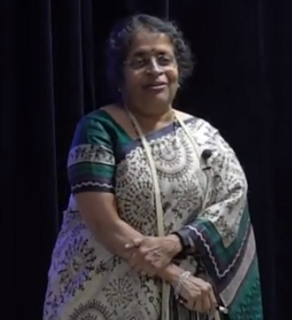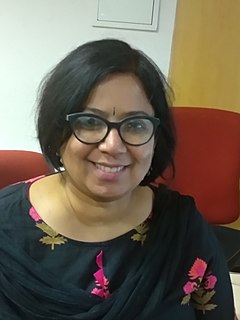Related Research Articles

Ashoke Sen FRS is an Indian theoretical physicist and distinguished professor at the Harish-Chandra Research Institute, Allahabad. He is also an honorary fellow in National Institute of Science Education and Research (NISER), Bhubaneswar, India and also a Morningstar Visiting professor at MIT and a distinguished professor at the Korea Institute for Advanced Study. His main area of work is string theory. He was among the first recipients of the Fundamental Physics Prize "for opening the path to the realization that all string theories are different limits of the same underlying theory".

Thanu Padmanabhan was an Indian theoretical physicist and cosmologist whose research spanned a wide variety of topics in gravitation, structure formation in the universe and quantum gravity. He published nearly 300 papers and reviews in international journals and ten books in these areas. He made several contributions related to the analysis and modelling of dark energy in the universe and the interpretation of gravity as an emergent phenomenon. He was a Distinguished Professor at the Inter-University Centre for Astronomy and Astrophysics (IUCAA) at Pune, India.
Narasimhaiengar Mukunda is an Indian theoretical physicist.

Narayansami Sathyamurthy is a chemist in India. He is the founding director of the Indian Institute of Science Education and Research (IISER), Mohali, Punjab, India and the President of Chemical Research Society of India.

Vinod K. Singh is a Rahula and Namita Gautam Chair Professor of Chemistry at IIT Kanpur. He is also Director's Chair Professor at IISER Bhopal & adjunct Professor at NIPER Hyderabad. He is currently the President, Chemical Research Society of India and the Chairman, Governing Council of IACS Kolkata.
Somdatta Sinha is an Indian researcher and professor of biology, who is one of the earliest to start working in the area of theoretical biology in India. Her expertise is in the interdisciplinary fields of mathematical & computational biology, nonlinear dynamics and complex systems with a view to understand the logic and design of biological processes. She studies spatio-temporal organization in biological systems – from biological sequences to spread of disease in populations – using mathematical and computational methods. She has played a central role in the development of mathematical and computational biology in her country through research, organization of scientific meetings, training programs, conferences, and teaching interdisciplinary courses at the undergraduate and postgraduate levels. Her research encompasses patterns, interactions, and dynamics of biological systems using mathematical and physical methods to understand complex multi-scale biological systems. Sinha's research contributions focus on modelling a variety of biological systems, such as, circadian rhythms, pattern formation, biochemical pathways, synthetic biology, single and meta-population ecological models, epidemiology, and controlling spatiotemporal dynamics. She has also carried out computational analysis of genomes for classification of organisms using Chaos Game Representation (CGR) and Multi-fractal analysis, protein structure-function analysis using graph theory, and network analysis of large biochemical pathways. Her publications have made important contributions in the respective fields and are highly cited. Her seminal contribution to the development of the interdisciplinary field of Mathematical and Computational Biology in India was acknowledged by the Department of Biotechnology, Govt of India with the National Senior Woman Bioscientist Award in 2013 and the J C Bose National Fellowship from the Department of Science and Technology, Govt. of India. She is a fellow of the Indian National Science Academy, Indian Academy of Sciences and National Academy of Sciences. She was elected Fellow of the Wissenschaftskolleg zu Berlin for 2000-2001 and International Visiting Research Scholar at the Peter Wall Institute for Advanced Studies at the University of British Columbia, Vancouver, Canada in 2018. She has traveled widely across the globe and given many invited talks in universities and conferences.
Sulabha Kashinath Kulkarni is an Indian physicist, whose research spans the areas of Nanotechnology, Materials Science, and Surface Science. She is currently a visiting faculty member at Indian Institute of Science Education and Research, Pune, India.

Rohini Godbole is an Indian physicist and academic specializing in elementary particle physics: field theory and phenomenology. She is currently a professor at the Centre for High Energy Physics, Indian Institute of Science, Bangalore. She has worked extensively on different aspects of particle phenomenology over the past three decades, in particular on exploring different aspects of the Standard Model of Particle Physics (SM) and the physics beyond it (BSM). Her work regarding hadronic structure of high-energy photons outlined a variety of ways in which to study it and has had implications for the design of next generation electron positron colliders. She is an elected fellow of all the three academies of Science of India and also the Science Academy of the Developing World (TWAS).
Sudeshna Sinha is a professor at the Indian Institute of Science Education and Research, Mohali. She was at the Institute of Mathematical Sciences, Chennai, for over a decade. She works in the field of nonlinear physics. Her work on 'chaos-based' hardware is being developed commercially by the US-based company Chaologix.

Sushanta Kumar Dattagupta, known better as Sushanta Dattagupta, is an Indian condensed matter physicist. He was Director of the S N Bose National Centre for Basic Sciences Kolkata between 1999 and 2005 and then he was appointed Program Co-ordinator by the Ministry of Human Resources and Development (MHRD) for the newly evolving system of Indian Institutes of Science Education and Research (IISER). Subsequently, in 2006 he was made the founding director of IISER Kolkata. After serving one full term there the same ministry of HRD made him the Vice-chancellor of Visva-Bharati, which is served between September 2011 and February 2016.
Dipankar Das Sarma, popularly known as D.D. Sarma, is an Indian scientist and structural chemist, known for his researches in the fields of Solid State Chemistry, Spectroscopy, Condensed Matter Physics, Materials Science, and Nanoscience. He is a former MLS Chair Professor of Physics and Chairman of the Centre for Advanced Materials and the GAST Professor of Uppsala University, Sweden, A recipient of TWAS Physics Prize and the UNESCO Biennial Javed Husain Prize, Sarma was honored by the Council for Scientific and Industrial Research (CSIR), Government of India, in 1994, with the Shanti Swarup Bhatnagar Prize for Science and Technology.
Belita Koiller is a Brazilian Professor of Physics at the Instituto de Física, Universidade Federal do Rio de Janeiro (UFRJ), Brazil. She is a Condensed Matter Theorist, and has contributed to the understanding of the properties of disordered solids, particularly disordered chains and semiconductor alloys. More recently, she has been interested in quantum control of individual electron spin and charge in semiconductors, aiming at applications in quantum information and quantum computing.

Shobhana Narasimhan is an Indian academic who is Professor of Theoretical Sciences at the Jawaharlal Nehru Centre for Advanced Scientific Research in Bangalore, India. Her main area of interest is computational nanoscience. Her research examines how the lowering of dimensionality and reduction of size affect material properties. She is a Fellow of the Indian Academy of Sciences.

Deepak Kumar was an Indian condensed matter physicist and a professor at the School of Physical Sciences of Jawaharlal Nehru University. Known for his research on quantum mechanics and other areas of condensed matter physics, Kumar was an elected fellow of the Indian Academy of Sciences. The Council of Scientific and Industrial Research, the apex agency of the Government of India for scientific research, awarded him the Shanti Swarup Bhatnagar Prize for Science and Technology, one of the highest Indian science awards, for his contributions to physical sciences in 1988.
Rahul Pandit is an Indian condensed matter physicist, a professor of physics and a divisional chair at the Indian Institute of Science. Known for his research on phase transitions and spatiotemporal chaos and turbulence, Pandit is an elected fellow of Indian Academy of Sciences, Indian National Science Academy and The World Academy of Sciences. The Council of Scientific and Industrial Research, the apex agency of the Government of India for scientific research, awarded him the Shanti Swarup Bhatnagar Prize for Science and Technology, one of the highest Indian science awards, for his contributions to physical sciences in 2001.

Pinaki Majumdar is an Indian condensed matter physicist and the director of the Harish-Chandra Research Institute. Known for his research on correlated quantum systems, Majumdar is a recipient of the Global Indus Technovator Award of the Massachusetts Institute of Technology. The Council of Scientific and Industrial Research, the apex agency of the Government of India for scientific research, awarded him the Shanti Swarup Bhatnagar Prize for Science and Technology, one of the highest Indian science awards, for his contributions to physical sciences in 2007.
Aditi Sen De is an Indian scientist, a professor in quantum information and computation group at the Harish-Chandra Research Institute, Allahabad. She is known for her research on quantum information and computation, quantum communication including quantum cryptography, quantum optics and many-body physics. The Council of Scientific and Industrial Research, the apex agency of the Government of India for scientific research, awarded her the Shanti Swarup Bhatnagar Prize for Science and Technology for her contributions to physical sciences in 2018. She is the first female physicist to be given this honour. In 2022, she has been elected as a member of Indian Academy of Sciences and Indian National Science Academy.
Catherine Stampfl is a Professor of Physics at the University of Sydney and was elected as a Fellow of the Australian Academy of Science in 2019.

Irvy (Igle) Gledhill is a South African physicist at the University of Witwatersrand, School of Mechanical, Industrial & Aeronautical Engineering, in Johannesburg.

The University College of Science, Technology and Agriculture are two of five main campuses of the University of Calcutta (CU). The college served as the cradle of Indian Sciences by winning the Nobel Prize in Physics in 1930 and many fellowships of the Royal Society London.
References
- 1 2 3 "Physics Faculty". www.hri.res.in. Retrieved 27 May 2020.
- ↑ "Fellowship | Indian Academy of Sciences". www.ias.ac.in. Retrieved 27 May 2020.
- ↑ Rao, S. S. (1983). "(B-L)-violation in grand unified theories".
- 1 2 "Indian Academy of Sciences talk page of Sumathi Rao".
- ↑ "Research Associates (Postdocs) | Theoretical Physics Department" . Retrieved 28 May 2020.
- ↑ "India's million-dollar scientist". BBC News. 8 August 2012. Retrieved 5 June 2020.
- ↑ "Overcoming fear and forging ahead" (PDF).
- ↑ "Sumathi Rao | Perimeter Institute". www.perimeterinstitute.ca. Retrieved 3 June 2020.
- ↑ "Sumathi Rao". www.hri.res.in. Retrieved 3 June 2020.
- ↑ "INSPIRE". inspirehep.net. Retrieved 3 June 2020.
- ↑ "ICTS Associates".
- ↑ "Department of Physics". Indian Institute of Science, Education & Research- Bhopal (IISER-Bhopal).
- 1 2 IndSciComm (19 May 2017). "Women in Science". IndSciComm. Retrieved 27 May 2020.
- ↑ Rao, Sumathi (1999). "Women scientists: A contradiction in terms?". Current Science. 76 (1): 24–26. ISSN 0011-3891. JSTOR 24101320.
- ↑ "IUPAP Working Group on Women in Physics". wgwip.df.uba.ar. Retrieved 3 June 2020.
- ↑ Godbole, Rohini M. (2005). "Women in Physics in India, 2005". AIP Conference Proceedings. Rio de Janeiro (Brazil): AIP. 795: 129–130. doi: 10.1063/1.2128297 .
- ↑ Rao, Sumathi; Adams, Jenni; Andam, Aba; Frederiksen, Ashild; Gupte, Neelima; Gyanchandani, Jyoti; Hooijer, Christa; O’Brien, John; Saeta, Peter (20 August 2002). "Topic 1: Attracting Girls Into Physics". AIP Conference Proceedings. 628 (1): 9–12. doi:10.1063/1.1505270. ISSN 0094-243X.
- ↑ "Fellowship | Indian Academy of Sciences". www.ias.ac.in. Retrieved 28 May 2020.
- ↑ "Vidwan | Profile Page". vidwan.inflibnet.ac.in. Retrieved 28 May 2020.
- ↑ "Fellows nominated in 2022". APS Fellows archive. American Physical Society. Retrieved 19 October 2022.